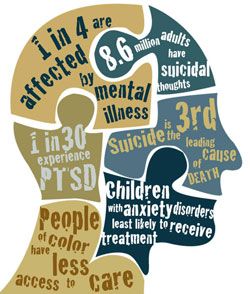Louise Stanger is a speaker, educator, licensed clinician, social worker, certified daring way facilitator and interventionist who uses an invitational intervention approach to work with complicated mental health, substance abuse, chronic pain and process addiction clients.
With May at our doorstep, I thought about the importance of Mental Health Awareness Month and the ways in which I continue to help my clients (who may experience substance abuse, mental health, process disorders and chronic pain) find and implement practices for strong mental health. One of the first ways to do this is through education – whether you’re experiencing a mental health issue of your own or concerned for a loved one – it is paramount to learn about the nuances of a disease. We can’t easily be packaged into a label, so we have to unpack ourselves and thereby recognizing the gifts that come from our struggles with living healthy and prosperous lives.
One such way is to understand what I have termed beyond triple threat. As a seasoned clinician/interventionist, I’ve had clients who experience a multiplicity of problematic behaviors – from substance abuse, to anxiety, depression, mania, bipolar disorder, which holds hands with process disorders such as gambling, debt, sex, etc. How about chronic pain – an issue exploding in the wake of the opioid epidemic? And then there is grief, loss, depression, emotional and physical abuse, etc. The spectrum of human experience and suffering is a crowded room. As such, we have to look beyond the traditional thinking of co-occurring disorders (such as dual –diagnosis from decades ago) in assessing families and their loved ones searching for that thread of hope.
For example, Imagine you have a 36-year-old male client who was in a serious car accident at age 16, which left him paraplegic. Today he is using methamphetamines and while able to drive and functions quite well, he has failed to launch from the house he was raised in, and goes no further than the local drug dealer. His family reactively coddles him as they feel the pain of his loss, not allowing him to grow, frozen in the headlights of his endemic grief. In this case, we have to map out a family tree, separate the two as they feed the problem in different ways, and treat the issue from every angle.
Or what about the business manager who calls you because they can no longer manage the financial interests of a well-known celebrity client? The family is a mess, the celebrity’s entourage is afraid to speak. The house is full of boxes and boxes of unopened merchandise she has purchased. She was seen stealing in a local boutique. She hears voices. Her personal assistants, hairdresser, stylist and others are silent, as they fear for their employment, as do her parents who have become part of the entourage she must support.
An 89-year-old mother calls you, as her New Year’s wish is to save her 43-year-old granddaughter and 63-year-old daughter. Her granddaughter houses a methamphetamine lab in her home and surrounds herself with men of nefarious goings-on; their favorite pastime is to break and enter cars. The police are frequent visitors. She has the cognitive capabilities of a fifteen year old and the rage of a tiger. Her mother lives in a nearby hotel smoking pot every day and is being supported by the hotel staff that love her and her eccentricities. Neither has had to truly work, and together they are both drowning in the stifling vicissitudes of trust funds, family histories of divorce, religiosity and substance abuse and both experience anxiety disorders.
With each case, as a clinician/interventionist, I find it essential to be empathetic, compassionate and strategic. We must prioritize intervention strategies that invite and respect the individual and identify therapeutic interventions to help the whole group. This triage includes picking the right treatment center, as not all treatment centers are created equal. By that I mean they have to specifically be able to meet the mental health, substance abuse, physical and legal needs of the client, and not just pay them glancing lip service.
Unfortunately, our health care system does not always meet the needs of the clients that experience a multiplicity of issues. I believe we must look at the treatment from micro, mezzo and macro perspectives — the individual who needs help, the treatment team supporting their treatment/recovery and the accountability team supporting the individual (i.e. parents, loved ones, their accountant, or hairdresser), everyone has to be on board with the client’s treatment path, as well as the health care system which affords treatment and provides for community recovery.
Recovery is manageable when you create effective strategies and one fully engages in the process. Like working the 12 steps of AA, it begins with identifying the problem – and finding the right kind of help and treatment from professionals like myself who have the tools to educate and implement. The work becomes easier, the days brighter. This Mental Health Awareness I encourage you discover the gifts in your life, reach out to a mental health specialist so that you may enjoy a life well deserved and well lived.
To learn more about Louise Stanger and her interventions and other resources, visit her website.


